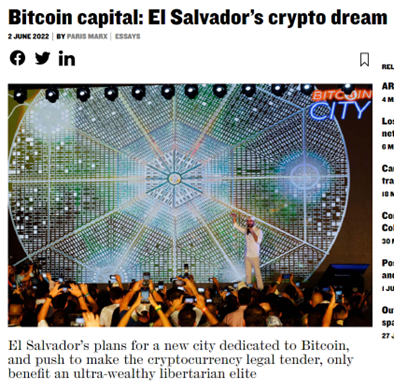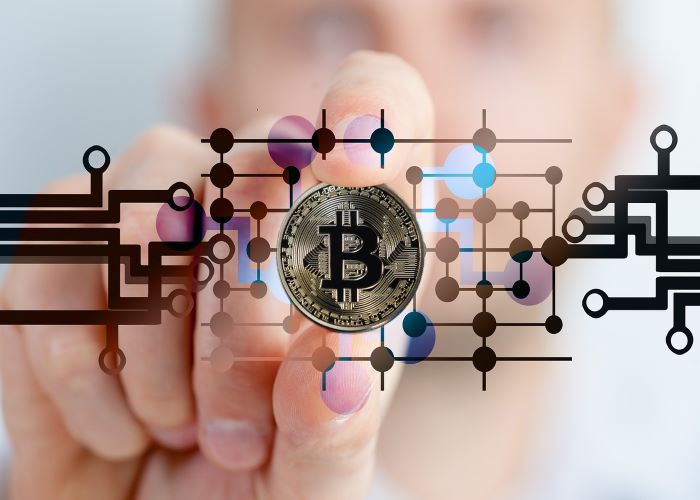If you would like to receive weekly updates like this, sign up here.
It’s unbelievable.
Amazing even. I almost can’t find the words here.
How could this possibly have happened?
Where do I start? Can you believe that El Salvador’s experiment with Bitcoin as its national currency is a failure?
I know – stunning right?
Or maybe not.
There’s a lot to unpack here, but as your first Property Cycle Investor blog for 2023, it’s worthwhile revisiting this project.
And the implications for the remainder of the 18.6-year Real Estate Cycle.
Many people ‘brought’ into the promise of a decentralized currency both metaphorically and literally, via an investment.
There is absolutely no doubt anymore what the future of crypto is now. It is now indelibly linked with the global land market.
So, if you already own crypto as an investment, or are interested in investing with them to secure a digital mortgage, or just an interested bystander, then today’s blog is aimed at you.
I’ll explain to you the background behind President Bukele’s decision to make bitcoin his country’s new national currency.
How bitcoin champions across the globe rejoiced at this decision!
But the irrevocable truth is that one man has played almost everyone for fools and ended all hope for bitcoin to be anything more than a land grab.
Is this a controversial view?
Perhaps, but give me three minutes and you may not look at cryptos in the same way again.
Do you want your money ‘forced’ upon you?
In markets, one of the key advantages you seek is to become a first mover in an emerging trend.
It appears this was one reason why El Salvador decided to adopt bitcoin as its national currency.
So, on June 1st, 2019, newly elected President Nayib Bukele proclaimed that bitcoin would now be the national currency.
Not much was made of this initially unless you were part of the crypto crowd at the time, which relished another opportunity to push their claims for widespread mainstream adoption of bitcoin.
However, for the residents of El Salvador, their response was much more skeptical.
In 2001, long before Bukele arrived on the scene, El Salvador phased out its domestic currency, the Colon, and introduced a US dollarized competitive-currency regime, one in which the US dollar was legal tender, but any other currency could be used.
Since then, the country has rediscovered economic stability. What occurred was most consumers traded and paid for their goods and services with Colons pegged to the US dollar.
The thing is though, this initiative worked better than imagined. The country experienced low inflation and strong economic growth.
No wonder so much domestic pushback was experienced from President Bukele’s announcement.
Now, one important part of the El Salvador economy was something well known across much of South America, though it’s not as prevalent in places like the US or Australia.
It is called remittance. A way that family members can gain employment overseas for higher wages than they could reasonable expect back home, and then send back some of this money to support their families in El Salvador.
Above all else, this change in the national currency put the entire system at risk.
So, in September 2021 when Bukele made his idea law, he knew that he had to sweeten the deal with residents and voters.
The Salvadoran government designed and launched an app, the “Chivo Wallet.” It was intended to facilitate transactions in bitcoin. Salvadorans were encouraged to download the app.
Indeed, doing so was accompanied with a $30 gift which was a large part of the average workers weekly salary.
Bukele claimed that the law would lower the cost of remittances to El Salvador and would improve the country’s financial inclusivity.
At this juncture, it’s worth asking: was this a ‘legal tender’ or a ‘forced tender’?
Article 7 of the law stipulates that “every economic agent must accept bitcoin as payment when offered by whoever acquires a good or service.”
When you ‘force’ something on someone, don’t be surprised if they refuse to comply.
What happened was almost 80% of all merchants simply never transacted in bitcoin.
So, no financial inclusivity then.
As for the Chivo wallet, and the promise of low-cost remittance, the fact is the traditional wire transfer cost in El Salvador were already one of the lowest in South America, a by-product of pegging their national currency to the US dollar in the first place!
Not surprisingly, a National Bureau of Economic Research working paper found that in February 2022, a miniscule 1.6 percent of remittances sent to El Salvador were received via Bitcoin.
Again, the second pillar of Bukele’s ‘promise’ to the people of El Salvador shown to be nothing but hot air.
You could make a case the residents of El Salvador saw right through their president’s bluster and have benefitted by insulating themselves from the recent brutal performance of bitcoin and cryptos in general lately.
So, what’s really going on then?
It’s clear mass adoption of bitcoin in this country is remote at best. Why would anyone persevere with this idea, why spend vast amounts of national treasure on a premise that has proven to be so unpopular?
Read. The real motive behind this decision is about to be laid bare.
Building Bitcoin City
Over $300 million dollars has been pulled from treasury reserves by the president and plowed into this bitcoin venture. Don’t you think such a small country could have used that same money for schools or hospitals instead?
By doing so he risked a credit downgrade for his country. That’s because how El Salvador pays its bond interest is reliant on a currency (bitcoin) that could be worth $60,000 a coin today and $50 a coin tomorrow.
Now recall he did provide some of that money directly back to the people via the $30 incentive to download and use the Chivo wallet.
This prompted the president to triumphantly declare that over 30% of all El Salvadorian’s are actively using this wallet.
Well, duh!
They want their $30 US dollars, of course they will download the app to get it! Subsequent usage of these same wallets after the money has been taken out has yet to be presented by the government.
So, the clues we need to see what’s really going on won’t be found by waiting for mass adoption.
The key as always is the land.
There are only 200 ATM’s that allow bitcoin transfers. Only those business owners most connected with Bukele were allowed to establish them on their business premises.
That’s to drive business to them, and to ensure that the land they sit on becomes more valuable.
A sure sign of the corruption going on at the very top. Bukele has been accused of turning himself into a dictator and all that this entails.
Which means, as usual, the opportunity to take what’s public and make it private. Bukele has positioned himself to benefit from his so-called “Bitcoin city”, next door to the Conchagua volcano in southeastern El Salvador.

Source – architectural review.
The president has ensured he and his cronies have pre-purchased the majority of land this city is supposed to be built on, not using their own money but via a bitcoin bond.
And the volcano, well, that’s so the geo-thermal energy it produces will enable crypto miners to use it as a green energy source.
Replace the notion of a “bitcoin revolution” with a “naked land grab”. Once again, this is simply a capture of the naturally occurring rent of land for private benefit at the expense of everyone else.
Why do we all keep falling for this? It’s no longer global corporations that indulge in this, it’s now dictatorial leaders using their country for private gain.
There is nothing new under the sun. I can assure you this behavior, arguably involving cryptos, will only get more fanciful.
Here is the truth: Bukele’s position as a bitcoin champion is simply a smokescreen to hide his true plan.
Cryptos are a means not the end.
Better to borrow funds you have no intention of ever paying back and buy previously useless land around the base of a volcano and capture for yourself the windfall gains as Bitcoin City is built.
A way to capture institutional funds and international acclaim that El Salvador could never obtain via traditional methods.
It’s working. I mean I’m writing to you today about it.
This is the tried and proven playbook that every real estate cycle in history has shown us. It’s the noise surrounding a country adopting a crypto as a national currency that hides the truth.
As far as I’m aware, there is no-one globally who is identifying precisely how cryptos and the real estate cycle are related to each other.
Your front row seat to this kind of information is via a membership to the Boom Bust Bulletin (BBB).
Learn the history of the real estate cycle. Develop the ability to view the world around you through the lens of the land market and take full advantage of the timing this knowledge can give your investments.
El Salvador’s holdings of over $300 million in bitcoin have experienced a $60 million dollar loss this past year.
Over $600 million worth of bonds are due to be repaid next month. The IMF has refused to step in as lender of last resort due to its concerns about the unregulated nature of cryptos and the excessive energy use of bitcoin mining.
Do you understand now why it was so important to build Bitcoin City next to a volcano?
An attempt to impress the IMF of their green crypto-mining credentials to get the money El Salvador desperately need.
What…a…farce!
Gain your market edge with the BBB, learn to cut through the noise and correctly position yourself with the inherent timing only the 18.6-year Real Estate Cycle can provide you.
Understanding the land market is the key to investment success.
Best wishes,

Darren J Wilson
and your Property Sharemarket Economics Team
P.S. – If you would like to receive weekly updates like this, sign up here.
P.P.S – Find us on Twitter here and go to our Facebook page here.
This content is not personal or general advice. If you are in doubt as to how to apply or even should be applying the content in this document to your own personal situation, we recommend you seek professional financial advice. Feel free to forward this email to any other person whom you think should read it.


